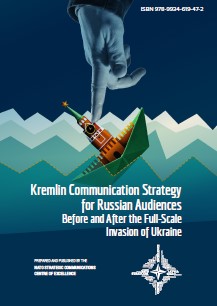RUSSIAN FEDERATION OFFICIAL STATEMENTS AND MEDIA MESSAGING ANALYSIS
RUSSIAN FEDERATION OFFICIAL STATEMENTS AND MEDIA MESSAGING ANALYSIS
Author(s): Laima Venclauskienė, Karina Urbanavičiūtė, Viktoras Daukšas
Subject(s): Media studies, Government/Political systems, Political behavior, Politics and communication, ICT Information and Communications Technologies
Published by: NATO Strategic Communications Centre of Excellence
Keywords: Russia; media messaging analysis; Government communication;
Summary/Abstract: Strategic use of information is a long-term practice of the Kremlin. Concepts and methods which originated in the Soviet Union, though growing more sophisticated over time, became a blueprint for the current Russian government. Past and present leaders residing in Moscow have never been shy in calling information what it is to them—a weapon. Lenin’s Decree on the Press from 1917 warned that the press is one of the most powerful weapons, ‘no less dangerous than bombs and machine-guns’. In 2015 Russian minister of defence Sergey Shoigu repeated the same statement, saying that ‘the day has come when all of us recognize that the word, the camera, the photograph, the internet and information in general have be-come yet another type of weaponry, another branch of the armed forces’. The strategy is even more apparent when we look at the situation of the press in-side Russia (which, based on the level of restrictions and control, is not that far off from the Soviet past). As Vladimir Putin came to power in 2000, through a series of not so subtle operations (such as the takeover of the NTV channel3) and well-thought-out legal traps (the case of TV Dozhd’), media outlets which had even a fraction of independence fell under the control of the state.4 And since then the chokehold around the press has be-come tighter and tighter.
- Page Range: 49-97
- Page Count: 49
- Publication Year: 2023
- Language: English
- Content File-PDF

